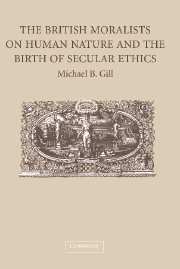Book contents
- Frontmatter
- Contents
- Introduction
- PART ONE WHICHCOTE AND CUDWORTH
- 1 The Negative Answer of English Calvinism
- 2 Whichcote and Cudworth's Positive Answer
- 3 Whichcote and Cudworth on Religious Liberty
- 4 Rationalism, Sentimentalism, and Ralph Cudworth
- 5 The Emergence of Non-Christian Ethics
- PART TWO SHAFTESBURY
- PART THREE HUTCHESON
- PART FOUR DAVID HUME
- Notes
- Bibliography
- Index
1 - The Negative Answer of English Calvinism
Published online by Cambridge University Press: 29 July 2009
- Frontmatter
- Contents
- Introduction
- PART ONE WHICHCOTE AND CUDWORTH
- 1 The Negative Answer of English Calvinism
- 2 Whichcote and Cudworth's Positive Answer
- 3 Whichcote and Cudworth on Religious Liberty
- 4 Rationalism, Sentimentalism, and Ralph Cudworth
- 5 The Emergence of Non-Christian Ethics
- PART TWO SHAFTESBURY
- PART THREE HUTCHESON
- PART FOUR DAVID HUME
- Notes
- Bibliography
- Index
Summary
Ralph Cudworth was born in 1617 in Somerset, England. His father, also named Ralph, was “a man of genius and learning” who was rector of the parish and chaplain to the king (Birch vii). Most importantly for our purposes, the elder Cudworth was a devout Calvinist. Describing the Calvinism of Cudworth's father is the goal of this chapter.
A defining feature of the English Calvinism the elder Cudworth preached and practiced was an ardent belief in the sinfulness of all humans. According to this Calvinist view, humans had originally been created pure and good but through original sin had fallen to the depths of degradation. As a result, each and every human is now corrupt through and through. The corruption of the Fall, moreover, was so complete, afflicting as it did all of our faculties, that we now lack even the ability to do anything to improve our degenerate state. Human sinfulness is inherent and ineradicable. All people deserve eternal damnation in hell. And when the elder Cudworth spoke of hell, he would have done so in vivid and horrifying terms – as an actual place of the most extreme, never-ending torment.
The English Calvinists did not believe that everyone would go to hell. They thought that God had predetermined that some few people – the elect – would be saved. But the vast majority would be damned. And, crucially, even the elect did not deserve salvation.
- Type
- Chapter
- Information
- Publisher: Cambridge University PressPrint publication year: 2006



